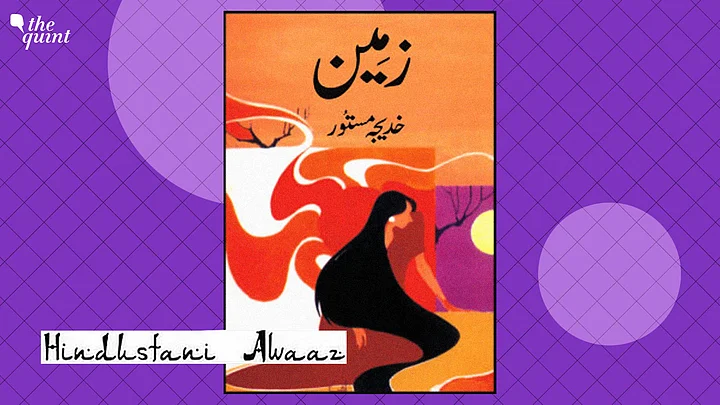Zan, zar, zameen – meaning women, wealth, and land – have been considered the root cause of all strife. Men are willing to lay down their lives protecting them. Of the three, however, more wars are fought over zameen, used variously to refer to land, country, earth, or ground. How, then, can it be absent in literature?
In Urdu literature, zameen is sometimes zaalim (cruel), sometimes tang (narrow), sometimes, so loving that it fashions manacles around one’s feet and sometimes that very love can prove to be a chimera, a false dream.
Sometimes the land turns into a field of death, stained with blood. Sometimes it holds out the promise of new beginnings, of starting over, of building on a clean slate.
Of the Lure of the Land
Intizar Husain’s trilogy, Basti, Naya Ghar, and Aagey Samandar Hai speak of the lure of the land, telling the stories of those who undertake the arduous hijrat to a new homeland, one that has been promised to them as the "Land of the Pure."
Khadija Marstoor’s Urdu novel Zameen too is set against the backdrop of the partition with its protagonist Sajida, one of the millions who have set out in search of a new homeland, a new zameen that will be theirs for ever more. The trials and tribulations of the crossover, the difficult life in the refugee camps, the lying and the cheating of the early days in the promised land.
Coming to poetry, the notion of one’s own piece of land has been dealt with by many poets. Nida Dazli would have you believe that the idea of ownership itself is flawed as in this sher:
Kabhi kisii ko mukammal jahaan nahiin miltaa
Kahiin zameen kahin aasmaan nahiin miltaa
(No one anywhere ever gets a complete world
Sometimes they don’t get the land, or the sky.)
Others believe that the only piece of land that can truly be one’s own is the grave – the proverbial do gaz zameen – in which one sleeps the eternal sleep under mounds of the earth till one is awakened on the Day of Judgment.
As Ganesh Bihari Tarz says:
Ye mahal ye maal-o-daulat sab yahiin rah jaainge
Haath aaegii faqat do gaz zameen marne ke baad
(These palaces, this wealth, and goods will all stay here
All you will have is simply two gaz of land after death.)
The idea is picked up by Shad Azimabadi thus:
Bataa hudd se sivaa hum paanv phailaain kidhar jaain
Faqat do gaz zameen apni hai aur saaton falak teraa
(Tell me, where should I stretch my feet beyond my bounds?
Only two gaz of land is mine; the seven heavens are yours.)
Bashir Badr rues that life has dealt him a poor hand by giving him land that is even less than the size of a grave:
Zindagi tu ne mujhe qabr se kum dii hai zameen
Paanv phailaauun to deewaar mein sar lagtaa hai
(Life, you’ve given me even less space than a grave
When I stretch my legs my head strikes the wall.)
Grave: The Ultimate Land of One’s Own
The idea of do gaz zameen (enough for a corpse to fit in a grave) finds its most poignant expression in this immortal sher by the last Mughal emperor Bahadurshah Zafar who was doomed to spend his last years in exile, far away from his beloved Hindostan:
Kitna hai bad-naseeb Zafar dafn ke liye
Do gaz zameen bhi na milii kuu-e-yaar me.n
(How unfortunate is Zafar, for his burial
He did not get even two gaz of space in his beloved’s street.)
The same do gaz zameen can become a metaphor for space in the beloved’s heart as in this sher by Jigar Moradabadi:
Mujh ko nahiin qubuul do-aalam ki vusatein
Qismat mein kuu-e-yaar ki do-gaz zameen rahe
(I shall not accept the vastness of the two worlds
As long as fate has two gaz land in my beloved’s street.)
Rahat Indori displays his typical insouciance when he says:
Vo jo do gaz zameen thhii mere naam
Aasmaan ki taraf uchhaal aayaa
(That two gaz of land that was marked for me
I have flung it towards the sky.)
Land and Belongingness
Turning away from the morbid view of zameen to the more pleasant ones, here is Shahryar voicing the wonder that beauty on this earth can be:
Gardish-e waqt ka kitna bada ehsaan hai aaj
Yeh zameen chand se behtar nazar aati hai humey.
(What a great favour the turning of Time has done to me
This earth appears better than the moon to me.)
And because in Urdu poetry, for every argument there is a counter-argument, here is Kaifi Azmi talking of the futility of finding a better home/land:
Main dhuundtaa huun jise vo jahaan nahiin miltaa
Naii zameen nayaa aasmaan nahiin miltaa
(I can’t find that world that I seek
I can’t find a new sky or a new land.)
And, taking the pairing of zameen and aasman further Ameer Minai remarks:
Hue naamvar be-nishaan kaise kaise
Zameen khaa gaii aasmaan kaise kaise
(How the well-known have been rendered nameless
How the earth has swallowed countless skies.)
(Rakhshanda Jalil is a writer, translator and literary historian. She writes on literature, culture and society. She runs Hindustani Awaaz, an organisation devoted to the popularisation of Urdu literature. She tweets at @RakhshandaJalil.)
